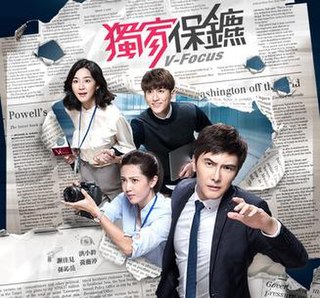The Lu Xun Literary Prize 鲁迅文学奖 is a literary prize awarded by China Writers Association. It is one of China's top four literary prizes and is named after Lu Xun and has been awarded every three years since 1995. Its predecessor, the National Outstanding Short Story Award and National Outstanding Novella Award, was established since the beginning of the new-era literature in the early 1980s.
The Politics of Guangdong follows a dual party-government system like the rest of China's provinces. Guangdong is known for a surge of legislative activism in recent years, often called the Guangdong Phenomenon. The Guangdong Provincial People's Congress has enacted measures to increase democracy and transparency, and exert more control over the financial sector. In a well-publicized case in 2000, the Guangdong PPC also harshly criticized the Environmental Protection Bureau for allowing the construction of an electroplating park without a proper environmental impact investigation.
The 16th Central Committee of the Chinese Communist Party was in session from 2002 to 2007. It held seven plenary sessions. It was set in motion by the 16th National Congress of the Chinese Communist Party. The 15th Central Committee preceded it. It was followed by the 17th Central Committee of the Chinese Communist Party.
The 15th Central Committee of the Chinese Communist Party was in session from 1997 to 2002. The 14th Central Committee preceded it. The China Democracy Party formed in this period, and was suppressed. It held seven plenary sessions. It was followed by the 16th Central Committee of the Chinese Communist Party.
The 14th Central Committee of the Chinese Communist Party was in session from 1992 to 1997. It held seven plenary sessions. It was preceded by the 13th Central Committee. It was elected by the 14th National Congress of the Chinese Communist Party and in turn elected the 14th Politburo of the Chinese Communist Party.
The 13th Central Committee of the Chinese Communist Party was in session from 1987 to 1992. It held seven plenary sessions. It was preceded by the 12th Central Committee and succeeded by the 14th Central Committee. It elected the 13th Politburo of the Chinese Communist Party in 1987.
The 11th Central Committee of the Chinese Communist Party was in a 5-year session from 1977 to 1982. The 10th Central Committee of the Chinese Communist Party preceded it. It held seven plenary sessions in the 5-year period. It was formally succeeded by the 12th Central Committee of the Chinese Communist Party.
The 10th Central Committee of the Chinese Communist Party was in session from 1973 to 1977. It was preceded by the 9th Central Committee of the Chinese Communist Party. It held three plenary sessions in the 4-year period. It was formally succeeded by the 11th Central Committee of the Chinese Communist Party.
The 9th Central Committee of the Chinese Communist Party was in session from 1969 to 1973. It was preceded by the 8th Central Committee of the Chinese Communist Party. It was the second central committee in session during the Chinese Cultural Revolution. Even amidst partial cultural disintegration, it was succeeded by the 10th Central Committee of the Chinese Communist Party. It held two plenary sessions in the 4-year period.
The politics of Shanxi Province in the People's Republic of China is structured in a dual party-government system like all other governing institutions in mainland China.
The politics of Zhejiang Province in the People's Republic of China is structured in a dual party-government system like all other governing institutions in mainland China.
The Politics of Ningxia Autonomous Region in the People's Republic of China is structured in a dual party-government system like all other governing institutions in mainland China.
The politics of Jiangsu Province in the People's Republic of China is structured in a dual party-government system like all other governing institutions in mainland China.
The politics of Tianjin is structured in a dual party-government system like all other governing institutions in the mainland of the People's Republic of China (PRC).

Royal Tramp is a 2008 Chinese television series adapted from Louis Cha's novel The Deer and the Cauldron. Produced by Zhang Jizhong and Huayi Brothers, the series consists of 50 episodes, filmed in high definition. The series was first broadcast on Jiangsu TV in China in 2008 and was subsequently aired on TVB in Hong Kong and other countries.
The 5th National Congress of the Kuomintang was held from 12–23 November 1935 at Nanking, Republic of China.

Hangzhou or Hang Prefecture (589–1129) was a zhou (prefecture) in imperial China located in modern northern Zhejiang, China, around modern Hangzhou. The prefecture was called Yuhang Commandery from 607 to 621 and from 742 to 758. Hang Prefecture was the capital of the Wuyue kingdom (907–978), inside which it was known as Xi Prefecture, and during its last years of the kingdom, as Qiantang Prefecture.

Mingzhou or Ming Prefecture (738–1194) was a zhou (prefecture) in imperial China located in modern northeastern Zhejiang, China, around modern Ningbo. The prefecture was called Yuyao Commandery from 742 to 758.

V-Focus is a 2016 Taiwanese television series starring Melvin Sia, Ling Hung, Huang Wei Ting and Yorke Sun. Filming began on September 21, 2016, and is filmed as it airs. The original broadcast began on October 26, 2016, on SET Metro, airing weekdays at 8:00 pm.
This page is based on this
Wikipedia article Text is available under the
CC BY-SA 4.0 license; additional terms may apply.
Images, videos and audio are available under their respective licenses.




